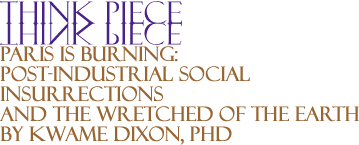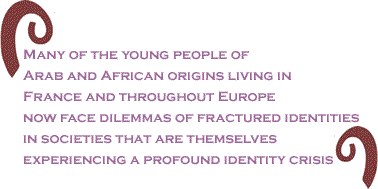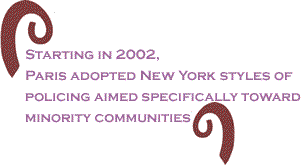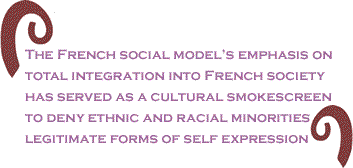
|
|||||||||||||||||||||
 |
|
France is in crisis. Widespread post-industrial social insurrections, commonly referred to as riots, unfolded on October 27, in the suburb of Clichy-sous-Bois north of Paris. While the precise details remain sketchy, what is known is that two teenagers, Zyed Benna, 17, and Bouna Traore, 15, apparently thought they were being chased by the police, scaled a wall, and were electrocuted as they hid near or under a transformer. A group of ten or more friends had been playing soccer and were going home when they came across a police control. In order to avoid the harassment, the lengthy questions and possible detainment by the police they all fled in different directions. Later that evening as the shocking news of the two deaths circulated, young people began to take to the streets. These events set into motion a series of widespread mini-intifadas. For more than two weeks, night after night, young urban actors who are primarily of Arab or African descent have swarmed the streets to demonstrate their rage and hostility towards a political system that has effectively ignored and excluded them. These low intensity mini-intifadas have since spread like wildfire to other neighboring towns and districts across northern and southern France. These uprisings, first reported to have unfolded around and near Paris, have since spread to others parts of the country. These post-industrial social insurrections may not be linked to traditional social movements; however, they represent a loosely defined network of national, regional, and transnational actors in the global struggle against neo-industrial oppression and exploitation. These communities are viewed as marginal, oppositional, minority, residual, emergent, alternative, and dissident in relation to the dominant cultural order. The urban actors are articulating a powerful message while simultaneously destabilizing the French social model of integration. Therefore, they should be seen as legitimate political actors. Simply put, the revolts represent the epicenter of accumulated social problems that France's political classes have allowed to fester for many years. The current social insurrections first unfolded on the northern edges of Paris where the first two digits of the postal code is 93. Politically, 93 is now a powerful social metaphor which means social exclusion, racial discrimination, high unemployment, and police repression, for those living in these communities. The mini-intifadas are now being characterized as France's worst civil unrest since the 1968 student revolts. The social crisis has rocked and embarrassed the current government, and left them scrambling, unable to respond in a coherent and coordinated manner. President Jacques Chirac has called for a strong response to the social insurrection. French Prime Minister Dominique de Villepin and Interior Minister Nicholas Sarkozy, both positioning themselves to run for president in 1997, have had to cancel trips abroad to deal with the crisis. Employing Nixon-like rhetoric, de Villepin said "law and order will have the last word." Sarkozy, playing to the right and far right electorate, called the rebellious youths "scum" and "riffraff." Unfortunately, his tough talk and posturing only served to provoke more unrest. Moreover, Sarkozy's hard-line approach has not only served to alienate many young people of Arab and African descent, but important players within his own government. Except for vacuous political slogans and incendiary rhetoric, the current government, after weeks of disorder, has not been able to adequately articulate a solution to the crisis. Despite an extraordinarily high presence of riot police and undercover agents across the northern and southern stretches of Paris the authorities still had not been able to quell the rebellions. As the crisis deepens, Chirac is facing intense political and popular pressure to bring the mini-intifadas to an end. François Hollande, leader of the Socialist party, said the social rebellions reflected the failure of government policy and leadership. However, given the social, racial, and religious calculus there are no easy solutions.
On Sunday November 6, in article published in the editorial page of the French daily Le Monde, Nicolas Sarkozy argued that a police centered approach to the current crisis is the best strategy. First, he blamed the former Socialist government and its emphasis on community policing for contributing to high crime rates during their tenure. Second, he argued that from 2002, which is when the current government came to power, until present, the crime rate has declined by eight percent. He attributes this decline to his government's decision to de-emphasize community policing and focus on more traditional methods of policing like "maintaining order and arresting criminals." There was no mention of a political plan or social strategy to address the deep structural problems underpinning these rebellions. Many in the French Arab and African community believe that in some ways Sarkozy is partly responsible for this social unrest. He has alienated young people with his zero tolerance anti-crime campaigns which include frequent police checks in Arab and African communities. These post-industrial social insurrections are firmly rooted in logic of French colonial history and are the consequences of colonialism, as many of the young people who have taken to the streets have ties to former French colonies in northern and sub-Saharan Africa. Like many social insurrections of the late 20th and early 21st centuries, they are first and foremost responses to neo-industrial oppression, and a reaction to the profound marginalization that many Arab and African youth face. As second and third generation immigrants whose families migrated from former French colonies in the 1950's and 60's, many of these young people are crisscrossing two cultural worlds; their French identity is rooted in the crosscurrents of colonialism which tags them as French but "other," or French-Arab and "hyphenated" - the hyphen suggesting that they are "less than" or pseudo-French. Moreover, their parents' world is scarred and skewed by colonial politics and history - many arrived after the painful process of decolonization - and this is a world that many of the young people may not identify with. The problems they face as victims of neo-industrial oppression include racial discrimination, advanced industrial poverty, extremely high rates of unemployment or low wage employment, and poor educational preparation.
France has a Muslim population of roughly 5 million out of a total of 60 million; it is also home to the largest immigrant community in Europe. There is a widespread belief that the already tense relations between these communities and law enforcement led to the current crisis spinning out of control. Concretely, police misconduct such as brutality, racial profiling and frequent unjustified stops and identity checks are major problems for many who live in these marginalized territories on the periphery of Paris. In a recent paper on comparative policing practices focused on New York and Paris, Cathy Schneider, an expert on race and policing, argues that starting in 2002, Paris adopted New York styles of policing aimed specifically toward minority communities. These included racially biased anti-crime wars, zero tolerance campaigns, and the creation of racialized boundaries separating minority from majority populations. Critics complain that the current conservative government, which came to power in 2002, cut back on former Socialist policies like community policing initiatives, and cut funds for social projects. According to SOS Racisme, a cutting-edge nongovernmental organization and one of the few human rights groups working to address racial discrimination, in 2002 the current government cut crucial funding for sports and after-school programs. Some believe that these cuts, combined with the harsh social conditions, may have also contributed to the current rage that has spilled into the streets. Living in post-industrial hell, the residents of the poorly maintained grey public housing projects have transformed these areas into a nightly battlefield where for 40 years the government has concentrated immigrants and their families in well defined districts away from city centers. In these areas designated as "special zones" it is estimated that unemployment is as high as 19.6 percent or double the national average; and more than 30 percent among 21 to 29-year-olds, according to official figures. The roots of these post-industrial social insurrections were first analyzed by Frantz Fanon, a medical doctor and revolutionary theorist from Martinique who wrote extensively on French colonialism. Fanon's contribution to understanding the psychology of colonialism is worth noting. As a politically conscious psychiatrist who factored political and social realities into the discipline of psychiatry, he recognized that individual and collective emotional disorders of oppressed peoples form part of the social pathology of colonialism, which denied the validity of people and their cultures. Like colonialism before, and advanced neo-industrial oppression now, both produce raw emotional rage, inferiority, alienation, self-hatred, conflicting social identities and other social disorders. Many of the young people of Arab and African origins living in France and throughout Europe now face dilemmas of fractured identities in societies that are themselves experiencing a profound identity crisis. Across Europe, communities of color, along with having to deal with an ensemble of hostile social forces, face tremendous odds as they attempt to develop cultural and social models that are genuinely multicultural, participatory and democratic.
In a move sure to stir more controversy, Sarkozy announced on Wednesday, November 9, to the French parliament the planned deportation of 120 people - including legal residents - who have been convicted to date. Sarkozy said that he has asked regional officials "to deport them from our national territory without delay, including those with a residency permit." Additionally, the authorities on the same day announced curfew measures for a handful of towns across France. The situation remains fluid and unpredictable, and may be subsiding even as unrest leapfrogged to other parts of Europe. The French social model, which emphasizes social integration, generous social benefits and social equality for all of its citizens, is not only being called into question, but destabilized by new social actors. The concerns of these actors must be addressed based on a new or different social model. Regrettably, the French social model's emphasis on total integration into French society has served as a cultural smokescreen to deny ethnic and racial minorities legitimate forms of self expression. As a consequence of these post-industrial social insurrections, France's national identity - whatever it was - will never be the same. However, France is not alone as this is a problem echoed throughout Europe. In the United Kingdom, Spain, and Germany - only to a name a few - communities of color face similar obstacles as they negotiate the treacherous divide between us and them. Kwame Dixon is distinguished visiting scholar of Black Studies at DePauw University in Indiana. This article was reported from Madrid, Spain. He can be reached at [email protected].
|
|
| Home | |
Your comments are always welcome. Visit the Contact Us page to send e-Mail or Feedback or Click here to send e-Mail to [email protected] e-Mail re-print notice
If you send us an e-Mail message we may publish all or part of it, unless you tell us it is not for publication. You may also request that we withhold your name. Thank you very much for your readership. |
|
| November 17 2005 Issue 159 |
|||||||||
|
|||||||||
|
|
|||||||||
| Printer Friendly Version in Plain Text or PDF format. Download free Adobe Reader. | |||||||||
 |
|||||||||
 |
|||||||||
| |
|||||||||
| |
|||||||||



























